The Last Days of Disco
by Whit Stillman
[DVD]
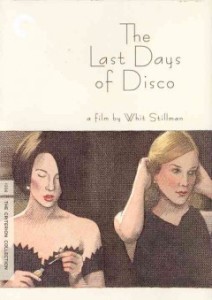
view/request
Whit Stillman’s third feature, The Last Days of Disco, is set in New York City the early 1980’s. Here we find a group of young professionals who are all, whether they are aware or not, in a period of transition. This moment of change also mirrors the current stage of the popular music (please see the title!).
Alice (Chloë Sevigny) and Charlotte (Kate Beckinsale), somewhat recent graduates of Hampshire College, are working in the lower echelons of the publishing industry. Despite having not much in common (and they can readily admit that they may not be ideal candidates for friendship), the duo decides to share a railroad style apartment with another young woman.
The tight living quarters teamed with Charlotte’s persistent insensitivity create a great deal of tension and bickering. Furthermore, there’s also tussling over potential/previous love interests. An escape from this turmoil is the local hot spot; it’s a fashionable discotheque possibly modeled in Stillman’s memory from his days hanging out at the famed Studio 54. Chris Eigeman, a Stillman mainstay, is cast as Des McGrath. McGrath is a sardonic manager at the said Manhattan club and he ultimately realizes that the owner has some sort of a shady operation going on.
When viewing The Last Days of Disco, one can’t help appreciating the dedication in creating such memorable characters and the overall writing in general. The film is filled with quick and witty dialog… most of which you cannot imagine being spoken by actual people. In one instance, Eigeman’s character begs the question, “do yuppies even exist? No one says, ‘I am a yuppie,’ it’s always the other guy who’s a yuppie. I think for a group to exist, somebody has to admit to be part of it.”
The struggle of social identity and finding one’s general placement in society underlie this brilliant comedic drama.
P.S. After a viewing, one may discover that disco does not suck!
Reviewed by Jason
Tagged: Comedy, Drama
Last Picture Show
by Peter Bogdanovich
[DVD]
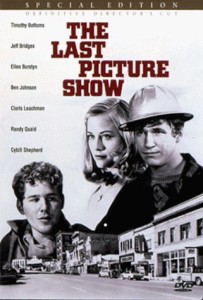
view/request
In keeping with the “New Hollywood” theme, I thought we’d take a look at another Roger Corman student and another film in the Criterion Collection’s America Lost & Found series. Following his directorial debut Targets (a brilliant “Frankensteining” of Corman stock footage of Boris Karloff and a completely new script about a local assassin), Peter Bogdanovich adapted Last Picture Show with the book’s author Larry McMurthy.
The film is set in a transitional period, both for the landscape and members of the graduating high school class, in a rural north Texas town in the early 1950’s. Timothy Bottoms, Jeff Bridges, Cybill Shephard and Randy Quaid play the local teenagers who are thinking about their futures outside of their small home town. Relationships, the military, money and taking care of family members all play important roles on these characters’ decisions. Two adult figures, Cloris Leachman and Ben Johnson, both won Oscars for their performances in supporting roles.
Robert Surtees’s soft black and white cinematography over the dusty roads and old shop signs hang a general feeling of loneliness over Last Picture Show. Bogdanvoich’s subtle humor, rich character drama and calculated pace, earn him comparison to the French master François Truffaut. He would also continue to look to the past, mostly filming in black and white, in years to come with films like Paper Moon, What’s Up Doc? and Nickelodeon.
In The Last Picture Show, we can feel that change will come in this part of Texas and that Red River shall inevitably have its final curtain.
Reviewed by Jason
Tagged: Comedy, Drama, Feature film
Zombie
by Fela Kuti
[Music CD]

view/request
Devoted followers of Fela Kuti include ?uestlove, Jay Z, David Byrne, Baaba Maal, Ginger Baker and Vampire Weekend. In recent years,
Knitting Factory Records [link updated 2020-05-05] has been a key player in creating what one might call a revival… or better yet, a “Fela-bration” to honor the late Afrobeat star. Album reissues, magazine features, curated boxed sets, a documentary and even a
Broadway show have been unleashed upon us adoring fans within the last couple of years. Our wallets are sad, but ears have never been happier.
The best way to describe Afrobeat to those unfamiliar is vocal based song with influences in jazz, funk and African highlife music. The reissued Zombie cd contains four such (lengthy) tunes with Fela’s excellent musicianship and commanding vocals. Chanted call and response singing, frenetic, pulsating rhythms, stellar percussion, a deep brass sound and an electricity (that no words can do justice) fill the album as well.
Zombie, like many of Fela’s albums, is a packed with a strong political message. The cover depicts the artist performing in concert with a juxtaposition of faceless, Nigerian soldiers meant to look like zombies. This 1977 release was a massive hit, but its radical lyrics and the mentioned cover art angered government officials. As a result, an attack was ordered on Fela’s commune. Sadly, he was severely beaten and his grandmother was tossed out of a window and would later pass away due to the injury. Fela Kuti lived on though and did not stop letting his voice be heard until his death in 1997.
Reviewed by Jason
Tagged: Africa
Richard Pryor: Omit the Logic
[DVD]
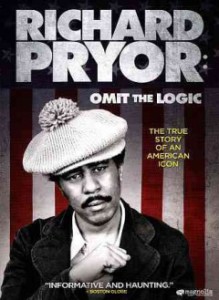
view/request
Marina Zenovich’s film is an excellent portrait of comedian and actor Richard Pryor. We see all the brilliance, unflinching confidence, missteps, self-destruction, triumphs and pain. Omit the Logic hits the ground running with Pryor’s earliest televised stand-up appearances with a routine resembling what Bill Cobsy was up to in the early 1960’s. However, after a disastrous set in Las Vegas, Pryor disappears and later resurfaces in San Francisco as a completely unique, uncensored entertainer.
The film highlights much of Pryor’s autobiographical material. After a fair share of belly laughing at these classic, personal routines about his childhood, relationships with women and drug use, the documentary leads us to Pryor’s difficult past. Contemporaries, colleagues and followers such as Bob Newhart, Paul Mooney, Dave Chappelle, Mel Brooks, Robin Williams and Whoopie Goldberg contribute anecdotes to Pryor’s perplexing story. It’s both noble and heartbreaking how Richard Pryor persisted to find humor in the darkest of places.
Reviewed by Jason
Tagged: Comedy, Documentary, Stand-up
Into the Lime
by The New Mendicants
[Music CD]
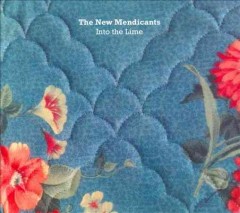
view/request
The New Mendicants are Joe Pernice, Norman Blake and Mike Belitksy. Pernice and Belitsky, Pernice Brothers alumn and current Toronto residents, met Blake (Teenage Fanclub) at a London gig back in 2000. About a decade later, Norman sent Joe a message: “Back in Canada at the end of next week. Want to be friends?”
Into the Lime‘s initial collaborative spark came care of submitting music for a film adaptation of Nick Hornby’s book A Long Way Down. Despite the novel’s dark subject matter, the album is a sweet sounding, almost like a modern day Everly Brothers record. Clever songwriting and close, two-part harmony are present throughout. Pernice takes many of the leads. He’s an American (once residing in Northampton, MA!) who tries to sound like a Brit. Blake’s pure, high harmonies are coming from a Scotsman maybe hoping one day to be a Byrd. The album is the perfect blending of voices and styles. The friendship and enthusiasm for this side project is clearly audible on the recording.
Reviewed by Jason
Tagged: Folk music, Pop music
Bored To Death
[DVD]
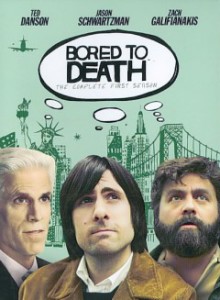
view/request
Jonathan Ames casts Jason Schwartzman as his alter-ego “Jonathan Ames” in the comedic, sleuth series Bored To Death. Ames is a young author from Brooklyn with motivational issues struggling to complete his second novel. One evening he turns to famed pulp writer Raymond Chandler for inspiration. After completing Farewell My Lovely, he proceeds to take out an advertisement on Craigslist boasting his reasonable rates and unlicensed detective services.
Each episode follows Schwartzman on madcap cases, painful romantic encounters and surprisingly tender buddy-buddy moments with brilliant co-stars Ted Danson and Zack Galifiankis. The show also features cameos appearances from John Hodgman, Patton Oswolt and Kristen Wiig.
Reviewed by Jason
Tagged: Comedy, Mystery, TV series
Three Solo Pieces
by Lubomyr Melnyk
[Music CD]

view/request
Ukrainian-Canadian composer Lubomyr Melnyk is positive that he’s the fastest pianist in the business. A boast from his website reads: “in exactly 60 minutes, Melnyk sustained an average speed of over 13 notes per second in each hand, yielding a remarkable total of 93,650 INDIVIDUAL notes.”
Despite Melnyk’s dexterity and technique, listening to Three Solo Pieces feels nothing like a frantic, fast paced album. Rather, this “Continuous Music” recording, which is filled with seamless melody and overtones, is a rich, mysterious and ethereal experience. Relying on a constant sustain pedal, this modern classical album is both cacophonous and soothing. Quite the feat and quite the recording.
Reviewed by Jason
Tagged: Contemporary music, Piano music
Judex
[DVD]
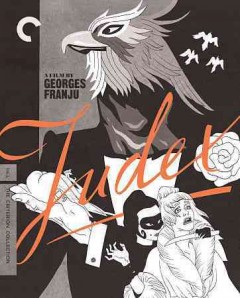
view/request
I tend to be someone who knows what he’s looking for in the stacks and will often go in with a list. We can’t always be a slave to structure though. Judex is a film I checked out based solely on the intriguing box cover. It also is a part of the Criterion Collection… so, I knew I was in for something interesting.
This 1963 French movie is an homage to a 1916 silent film of the same name. Set at the time of the original, Judex hits the ground running with a mysterious blackmail letter, a murder, strange sci-fi/occult touches and a stoic, caped man. Countless twists and turns, masks, hidden identities, a circus, knives and a lovable detective color this suspenseful caper. Furthermore, Judex is photographed in the most brilliant black and white with stylish camera angles that would make any film nerd’s heart have serious palpitations.
It pays to sometimes take chances with movies; going in blindly. However, I’ve done the work for you already on this one. So, go ahead and enjoy George Franju’s Judex!
Reviewed by Jason
Tagged: Feature film, Mystery
Inherent Vice
by Thomas Pynchon
[Audiobook]
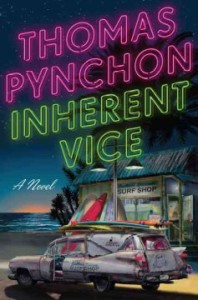
view/request
Ron McLarty narrates this bizarre and wonderfully entertaining crime novel by Thomas Pynchon. Infusing the perfect hippie bravado to our central character Doc Sportello, McLarty transports us to this far out time.
Filled with film and music references, original music (sung a capella by McLarty on the audiobook), hilarious dialog and a gritty tone, Pynchon creates a unique take on the detective novel. Doc, who is a long haired, stoner private-eye in Los Angeles at the close of the 1960’s, is on the case to find a missing ex-girlfriend. Along the way, he has run ins with colorful characters in this backdrop of groovy pads, surf music and drug culture.
Flower power is over and something darker is on the horizon.
Reviewed by Jason
Tagged: Fiction, Mystery
Show Me the Magic
by Paul Mazursky
[Book]
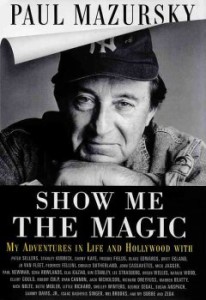
view/request
riter/director/producer/actor Paul Mazursky’s autobiography is an anecdotal collection of Hollywood tales, international adventures and reflections on growing up in Brooklyn. A real page turner, too! I ignored those around me and read this cover to cover in two evenings. Mazursky, who directed classics such as Bob and Carol and Ted and Alice, Blume in Love, Tempest, Moscow on the Hudson and An Unmarried Woman, has plenty of interesting tales to share.
The author recalls showbiz run-ins with Stanley Kubrick (Mazursky’s first major acting role was in Kubrick’s Fear and Desire), Orson Welles, Peter Sellers, George Segal, John Cassavetes, Gena Rowlands, Warren Beatty and Natalie Wood among others. What’s possibly the most fascinating is his relationship with Federico Fellini. It’s a touching friendship and their meeting is something of legend. In addition, Mazursky includes several letters from the great Italian film director in his book.
The title “Show Me the Magic” comes from one of the most exciting pieces of cinema history; a piece of dialog from Mazursky’s adaptation of Shakespeare’s The Tempest. Forever imprinted in my mind is the scene where John Cassavetes conjures up a small miracle… in a film that plays it straight up until that point. An unpredictable moment on screen and perfectly fitting coming the mind of a man who lived an exciting and unpredictable life.
Reviewed by Jason
Tagged: Film, Memoir, Non-fiction
Sensation: The Story of Tommy
[DVD]

view/request
I first heard the Who’s Tommy as a teen or pre-teen after borrowing a copy from the Russell Library in Middletown, CT. That’s really the age to delve into both the angst and sensitivity of the Who… in fact, it’s the best time to explore music in general as that feeling of the world opening up to you begins. What followed this library trip was a huge Who obsession and, after the realization that Pete Townshend and I share a birthday, I was convinced there was some sort of connection between myself and the music. I’m sure I wasn’t the only teenager who felt this way.
Martin R. Smith’s documentary doesn’t focus on the stellar musicianship of the band (that coverage can be found anywhere… I mean, listen to a Who album!); rather, it leads the viewer through Tommy‘s high concepts and tells the story of a band in a state of transition. It is evident we have a “pre” & “post”-Tommy Who for the history books. Tommy, an album many consider as the first “rock opera”, legitimized Pete Townshend as a true composer, gave Roger Daltry the confidence to stand out front as the powerful lead singer (often in fringe), took the Who to opera houses around the world and turned the band into a stadium rock monster.
The film features interviews with Pete Townshend, Roger Daltry, John Entwhistle (archival), Keith Moon (archival), former Who manager Chris Stamp, Tommy album artist Mike McInnerney, Who biographers and a couple Rolling Stone Magazine nerds. It also has audio recordings of Townshend demos and several live performance clips.
Reviewed by Jason
Tagged: Documentary, Rock music
The Art of the Steal
by Don Argott
[DVD]
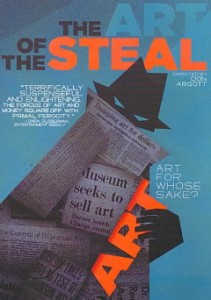
view/request
The Art of the Steal is a documentary that addresses the issue of public ownership of artwork. Don Argott’s film focuses on a much heated conflict in the state of Pennsylvania concerning the Barnes Collection and Foundation. Albert Barnes, a wealthy chemist turned art collector, acquired one of the most stunning Impressionist and Post-Impressionist collections in the world. He housed this uniquely curated collection along with a school as the Barnes Foundation in Lower Merion, PA. After his death in 1951, it was made clear by his will that the collection would not move nor would any of the work be sold under any circumstances.
Here’s where it gets interesting… Barnes’s wishes were not shared with many of the powerful Philadelphia politicians and society members. As management changed hands, the film highlights political nonsense and a long spiral of undermining of the collection’s owner over a sixty plus year period. Many issues arise in the dealings with the collection of art (now worth an estimated twenty-five billion dollars) and we really don’t have a clear cut understanding of whose interests are actually being served.
The Art of the Steal is a fascinating look into both the political and art worlds.
Reviewed by Jason
Tagged: Art, Documentary












